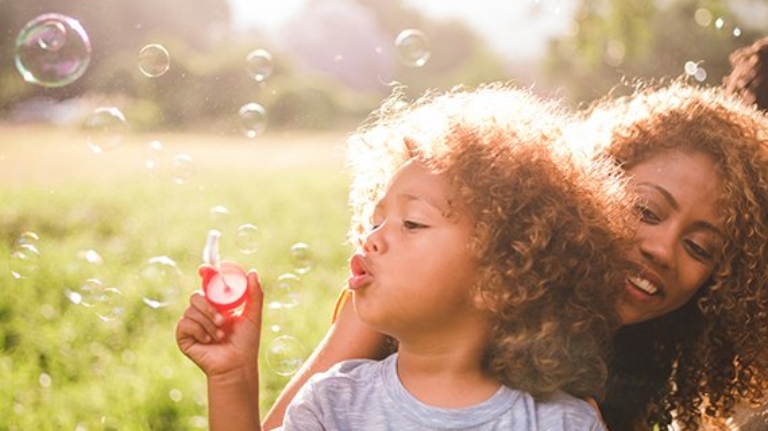Close your eyes and picture this. Your 2-year-old is racing around the house when they suddenly notice a sibling playing with a shiny toy. The toddler rushes over and snatches away the toy, screaming “Mine!” As the kids start to chase each other, they miss a step and tumble. All you hear is screams . . .
Does this sound familiar? I’m raising a toddler and a tween, so tumbles and tantrums seem like everyday occurrences in my home. I am here to tell you that we can decrease breakdowns by understanding our role, as parents, in developing our children’s self-regulatory skills.
What is Self-Regulation?
Self-regulation is the process that your child’s brain goes through that gives them the ability to control their behaviors and emotions in response to a particular situation. It’s having the skill to calm yourself down when you get upset, to adjust to a change in environment or expectations, and to handle frustration without outbursts. When children share, listen to others, or wait their turn, they are practicing self-control. It’s what we as parents call a “win!”
Self-regulation is a foundational skill of early childhood. It’s the seed we plant that allows children to grow into adults who can manage their emotions, thoughts, and behaviors. If we give children strategies to stay calm in stressful situations, they develop strong habits that they can apply in the future. Remember, there is not a single event that will magically kickstart a child’s perfect self-regulation. Just as children physically develop at different rates, they develop self-control at different rates as well. Building your child’s self-regulation toolkit requires thoughtful planning and understanding.
Simple Ways to Teach Self-Regulation
Throwing tantrums and acting out are natural but ineffective ways to handle high-stimulation situations. We can help our children by teaching them how to calm down effectively or to avoid impulsive reactions. Think about how we teach kids to ride a bike: It takes practice, patience, and more practice!
In the same way, we can coach our kids as they build their self-control muscles! For example, perhaps playdates with peers is a time when your child experiences negative emotions or has a hard time with social skills. Use these playdates as a chance to coach positive social behavior — offering breaks and using lots of descriptive praise for small accomplishments. Don’t be discouraged if you don’t see immediate results.
Here are some simple ways to support your child’s self-regulation skills on a daily basis:
- Rest and Nutrition! We have all seen how lack of sleep, dehydration, or a hungry stomach can derail a day! If we want to teach kids social-emotional skills, we also need to attend to their rest and nutrition. Sometimes what a tantrum-throwing toddler needs most in the moment is a snack or a nap.
- Breath in the Fresh Air: Provide opportunities for free play and outdoor play. Let the energy out. Increased heart rate = more blood flow to the brain = more brain power. When my older daughter starts to feel emotionally dysregulated, she often takes a walk in the fresh air. As her body begins to fill with happy hormones, her affect becomes calmer. You can also check out these active games that support self-regulation.
- Blow Away Troubles: Blowing bubbles is a kid-friendly way to practice deep breathing — and deep breathing calms the body down. Plus, who doesn’t like bubbles?! When you blow bubbles too quickly or too slow, it doesn’t work. You need to breathe from the belly, at a regular tempo. Speaking of deep breathing, yoga is another great way for kids to connect with their bodies and stay focused and calm. Try adding 15 minutes a day or a quick session after a meltdown.
- Read All About It!: Read books about emotions as a way to discuss all the feelings kids have. I love Todd Parr’s books (including The Feelings Book and It’s Okay To Be Different) and the way he displays an array of feeling vocabulary. In addition, sensory “touch and feel” books can help hold your child’s attention during reading time and stimulate their senses.
Listen Up! Calm music can help settle children down. And fun, simple songs can help children remember self-regulation strategies. Check out these Daniel Tiger songs about anger, taking turns, and waiting.
This great article was originally published by the Childhood Mental Health Specialist Brandy Wells on www.pbs.org.
- Teach Your Kids Discipline and Self-Regulation - January 11, 2018


